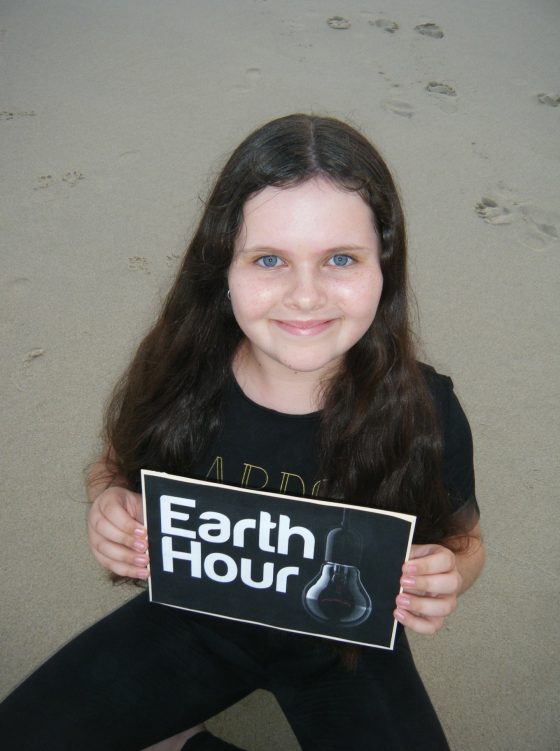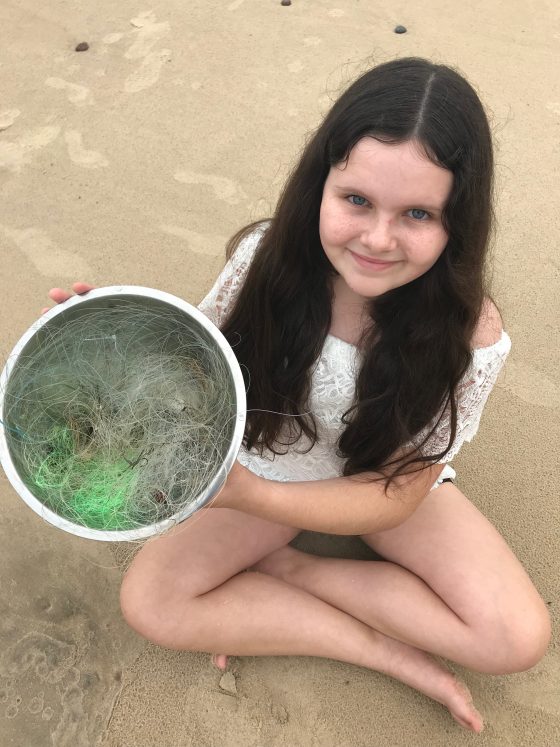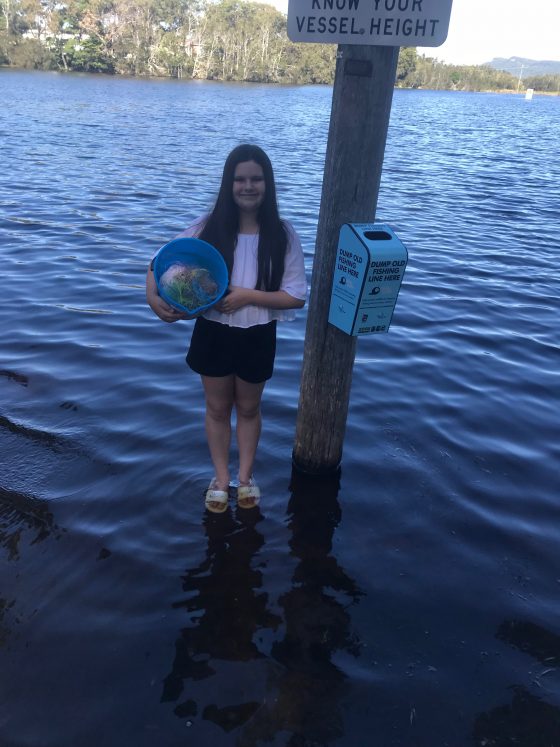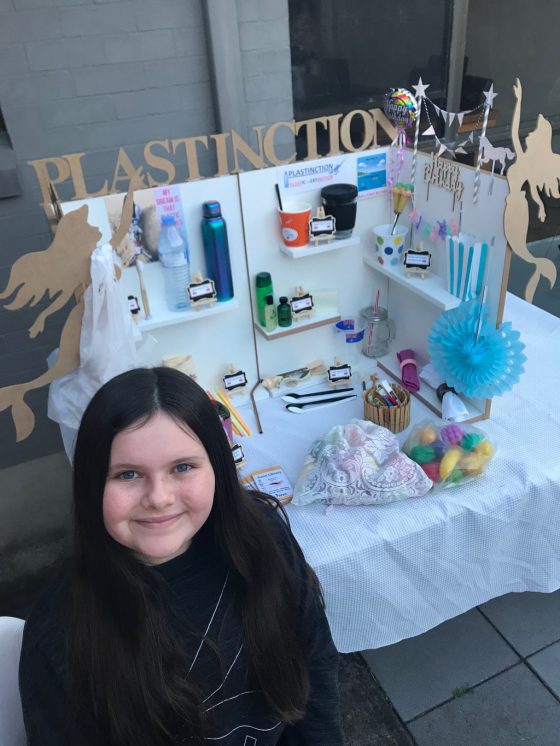Us students are growing up in a world that faces some of its biggest environmental challenges ever, and we will be the ones living with the consequences of all of the problems the planet is facing.
Written by Shalise Leesfield, Eco-Warrior

Every year, on Earth Day, it is a great reminder that we need to show our gratitude to Mother Nature. It’s a day where we come together to help protect our home, not just for our generation but also for those still to come. Earth Day began in 1970 and this year it turns 49, so ‘Happy Earth Day’ to our awesome planet. I hope we can all use this year’s Earth Day as a starting point for great change, and make every day an Earth Day. We can do this by looking at what can be done through the whole year and make taking care of the environment a regular part of how we all live. For me personally, I think it’s so important that my generation make sure they know exactly how to take care of the Earth, as we will be the caretakers of our planet in years to come. It is important that we all know what Earth Day means, and what we can do; not just one day a year, but every day so we can work together to keep the fragile environment free from further damage.
I believe that us young people are inheriting an Earth that is damaged and because of this, I’m working really hard to lead and inspire the next generation on how to work together to protect our ocean and our planet. Educating and inspiring students to live more sustainably is the best way we can help keep our planet healthy and this will help protect the most precious resource we have: the ocean. I have been doing my part with my school talks, expos, and festivals and over the past year, I have seen how well young people have responded to my ocean talks. All of this confirms my belief that education is the key to the future of the ocean.
Another confirmation that I am putting my efforts to good use – and that I have found my calling – was when I was chosen by Philippe Cousteau (grandson of the legendary underwater explorer Jacques Yves Cousteau) to be a part of his Australian expedition! I was interviewed as part of his ‘Youth In Action’ Program. This was so exciting for me! I was also chosen to launch the online EarthEcho Plastic Seas teaching resources in Australia! These online resources can be used by schools so teachers and students in Australia and all over the world for that matter, can learn how young people can work together and help protect our oceans from plastic pollution. I have conducted so much research on this topic and am thrilled to be doing an interview today with KiDS NEWS & REViEWS on my findings to share with all the youth, their families, and teachers!



Q & A With ECO WARRIOR, SHALISE LEESFIELD
KiDS NEWS & REViEWS: How did this all start for you?
SHALISE: A few years ago, I found out that every year, thousands of marine animals including seals, dolphins, whales and sea turtles, are injured due to people leaving behind their discarded fishing line and plastic pollution. I started noticing a lot of unwanted fishing line and rubbish around my local waterways, and when I found out on the Internet about how bad plastic pollution can be for the marine animals, it made me really sad. I wanted to become a voice for them and help out as they can’t speak for themselves. It became my mission to clean up the local beaches to help save aquatic animals and bird life. I have a real passion for our marine animals – especially the humpback whales – and when you love something, you want to protect it.
KiDS NEWS & REViEWS: So you had a desire, and what did you do next?

SHALISE: I started the project by doing my own environmental studies in my area. This included taking a lot of photos and documenting what I was finding in and around the waterways. I put this information together and presented it to the Port Macquarie Council. After assessment of the information, my request to install two trial collection bins was approved by the Waste Projects Officer – Development and Environment, Port Macquarie/Hastings Council!
KiDS NEWS & REViEWS: That’s amazing Shalise – congratulations! It sounds like this involved a lot of follow up on your part. Can you explain further so we understand all the steps involved that you had to go through to turn your vision into a reality.
SHALISE: For sure! I continued to do environmental studies and monitored the two trial bins for several months and once again, I presented this new information to the council to see if I could continue to install a lot more of these fishing line bins in the region. Recently the State Government announced that I will be getting part of an Environmental Litter Grant (from the Environmental Protection Authority) to fund the installation of additional fishing line collection bins in our community – this will also include a local ranger and educational signage around our community to promote the impacts of fishing related litter!
KiDS NEWS & REViEWS: That’s incredible Shalise! What will the grant funds be used for exactly?
SHALISE: This money has now been awarded and it is being used to target local litter hotspots and work to improve community behaviour when it comes to doing the right thing with marine debris. Marine-based litter is being targeted, particularly discarded fishing line, hooks, and other fishing waste generated by local fishers in the area. The funding is so important as it is helping to educate and engage with fishers on correct line disposal and making them aware of the impacts of littering. Fines will be issued for those who continue to litter. This is the most exciting news ever and a dream come true that I can now continue my project thanks to the current funding!
KiDS NEWS & REViEWS: It must be so rewarding to see all the results of your hard work and vision coming to reality. Where are the new bins being installed?
SHALISE: The new fishing line collection bins have been installed in six different locations around our region and this also includes educational signage and posters alongside the bins.
KiDS NEWS & REViEWS: As an expert on this subject, can you please tell us a little bit about why fishing line is so harmful to the ocean and it’s surroundings?

SHALISE: I’d love to! Monofilament Fishing line is one of the most harmful forms of marine debris that gets washed into the ocean because it’s strong and invisible in the water. A lot of marine animals can’t see it floating in the water and can get tangled in it and, worst of all, they can’t break free. It is also a problem as fishing line can take up to 600 years to break down in the ocean. Because of this, sea turtles, marine mammals, and even sea birds can be severely injured or die from entanglement in forgotten line.
KiDS NEWS & REViEWS: Can you now tell us a little bit about these fishing line bins and their function.
SHALISE: I thought you’d never ask! The collection bins are such a great resource for the community as people can use the fishing line collection bins to dispose of any unwanted fishing line and hooks to reduce the amount of fishing line finding its way into the ocean. The fishing line collection bins are installed in popular fishing locations and give people a convenient and secure place to dispose of any unwanted fishing line and hooks. The bins are designed in a way to stop animals and bad weather from pulling the fishing line back out into the environment again. This ensures this waste never harms the wildlife.The bins are highly visible and act as an advertisement that teaches people that may not know how much damage the fishing line they throw away is doing to our marine animals. It also reminds them to keep an eye out for any aquatic rubbish they see lying around so they can help the environment and dispose of it correctly. The local people have been very supportive of the bins and I have had a lot of people come and ask me how they can help. The waterways in Lake Cathie are a lot cleaner since the bins have been put up and there is hardly ever any line on the ground.
KiDS NEWS & REViEWS: You mentioned when we were chatting that not only do the fishing line collection bins help wildlife, they also help us humans too. Can you tell us how exactly?
SHALISE: Of course! I have seen so many rusty hooks left lying around the shorelines and boat ramps which could potentially be walked on and get stuck in a person’s foot. Our beach area is very popular for young swimmers and I am so glad that my project has also helped keep the discarded fishing hooks off the ground, keeping the kids in my area safe.
KiDS NEWS & REViEWS: That’s wonderful Shalise. We thank you on behalf of all the safe kids on your beaches! Knowing you and all your ambitions to campaign for the marine mammals in our ocean, what are your longer term goals when it comes to all of this?
SHALISE: One day it would be a dream come true for me to see these bins installed in all coastal areas around Australia, especially NSW (New South Wales)! I have already started sending out e-mails and information to some of the council’s in NSW, to see if they would be interested in installing fishing line bins around their waterways too.I wanted to promote the bins to the councils as they encourage anglers to take responsibility for their fishing products, provides them with a convenient and secure place to dispose of their unwanted fishing line, sinkers and hooks which leads to positive behavioural changes towards correct line disposal.
KiDS NEWS & REViEWS: We love your goals, your vision, and your dedication to what you are doing Shalise and will list all your contact information at the bottom of this story so any additional sponsors can reach your directly, to support and help you with your incredible campaign ideas that are already proven to be so valuable to your community-at-large. And now, we are going to allow you to finish telling us the rest of your story below, as you steer us towards another campaign that you are starting that is equally as important for our environment and in keeping with our vision of sustainability on this 49th Earth Day.
NEW CAMPAIGN – SCRAP THE BOTTLE




I’m also starting to work on a campaign about single-use plastic water bottles and how we should all swap over to a reusable water bottle. On my beach clean-ups, plastic water bottles and plastic water bottle caps are the most common items I find and because of this, I thought a great campaign to move forward with could be called ‘Scrap The Bottle’. Single use plastic water bottles are very wasteful, causing a lot of pollution around the world and they are harmful to our beautiful marine animals. Oil and energy are used in the manufacturing of the plastic water bottles and also recycling them takes even more energy. It is estimated that a staggering one million single-use plastic bottles are purchased around the world every minute — that’s about 20,000 bottles every second! This is a very important reason why we need to take action against plastic water bottles and help change our habits. Consumers need to be empowered to make a change to their bottled water drinking habits. The first, cheapest and most effective option is drinking tap water in a re-usable water bottle. It really is that simple! This easy and small behavioural change will help protect the millions of ocean animals and their habitats that are sadly impacted by plastic pollution each year and it will also improve the quality of life for us, humans, now and in the future. Simple and easy changes to how we stay hydrated can have a drastic and welcomed effect to the number of single-use plastic bottles that are thrown away every day. Let’s start looking after this beautiful planet of ours and say goodbye to single-use plastics!

These are all new things that I am working on. I started my ocean work by setting up fishingline collection bins close to my home and from this work, I received a state government grant to expand this program around Australia. This led to my appearing on two popular Australian TV shows: The Project and Behind The News. Here, I was able to spread awareness nationally about the fishing line bin project. On the way, I made a beautiful and unique friendship with a wild pelican who I call Mr Percival. Mr Percival keeps me company on my shore-line cleanups at the beach and lake. Mr Percival and I meet up each day and spend time with each other. He is my best mate.



One last note. As an environmental campaigner, I’m aware that what we do each day really does take a toll on the planet and we need to be a little kinder to our world. Us humans create a lot of waste and many of the things we use contribute to pollution to the air, water, and the earth. The good news is that with a few small changes in our daily routines, we really can make a big difference in our personal footprints. One of the ways I enjoy spending Earth Day is by helping out at beach cleanups. Another thing I always talk about is that caring for the environment doesn’t require you to become an environmental activist. Just be eco-conscious! Remember, no matter how small, every action you take to reduce your carbon footprint will help create a cleaner planet. I also have a story that came out today at Kidzworld USA – it’s so exciting! This story is all about the suggestions I have been invited to pose to my peers about how they can get involved in helping our planet. I love inspiring my generation and future generations to come, through the work that I do!





Thank you Shalise, for writing this amazing story for us on this year’s Earth Day. We look forward to featuring you here whenever you have something new you would like to share with us. Whether it be about a new campaign that you are launching or even an update on your special connection with Mr Percival! Keep up the amazing work that you are doing!
NOW LET’S MEET MR PERCIVAL!
Shalise Leesfield is one impressive 12 year old girl. She is an environmental campaigner and in addition to everything you’ve already learned about her and her accomplishments, her ocean work has also been awarded from the Premier of NSW and the Member for Port Macquarie, Leslie Williams visited her school to present Shalise with her this State honour. Members of Parliament usually only present one or two of these awards per year to a nominee that is held in high regard in the community with strong ethical and community values.Shalise is the first school-aged person to receive this prestigious award and hopes that this honour can further inspire her young peers to engage in activism.
We look forward to keeping in touch with Shalise and covering a feature story about her special relationship with Mr Percival and his appreciation for her shoreline cleanups at his home which is probably why he finds her such a trust-worthy mate!
You can follow Shalise here:
Instagram – @shalisesoceansupport
Facebook – @shalisesoceansupport
Website – www.plasticfreeschools.com.au


